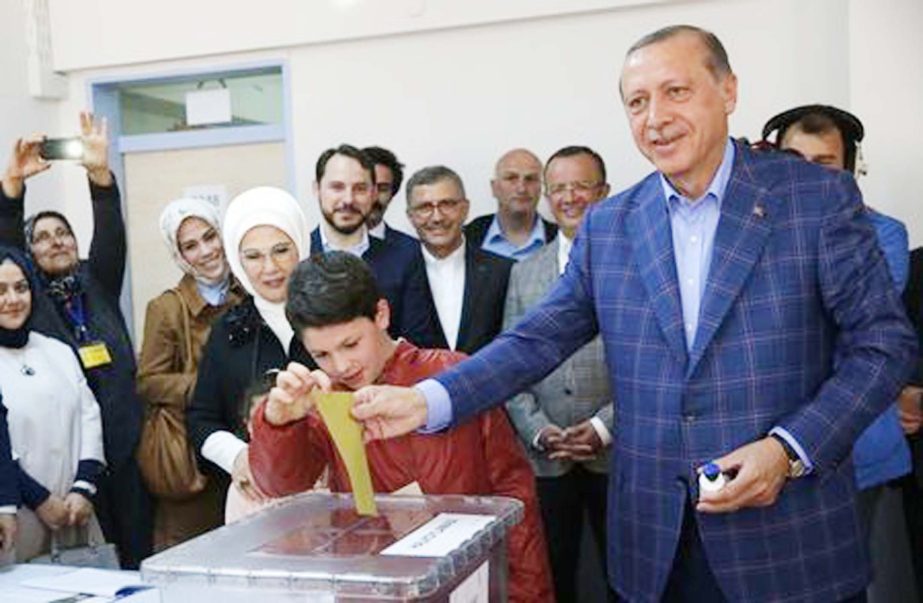
Reuters, Ankara :
Turks cast their votes in a referendum on Sunday that could place sweeping new powers in the hands of President Tayyip Erdogan and herald the most radical change to the country’s political system in its modern history.
Opinion polls have given a narrow lead for a “Yes” vote, which would replace Turkey’s parliamentary democracy with an all-powerful presidency and may see Erdogan in office until at least 2029.
The outcome will also shape Turkey’s strained relations with the European Union. The NATO member state has curbed the flow of migrants – mainly refugees from wars in Syria and Iraq – into the bloc but Erdogan says he may review the deal after the vote.
Some 55 million people are eligible to vote at 167,140 polling stations which opened at 7 a.m. (0400 GMT) in the east and 8 a.m. in the rest of Turkey. Voting ends at 5 p.m. (1400 GMT). Turkish voters abroad have already cast their ballots.
“This is our opportunity to take back control of our country,” said self-employed Bayram Seker, 42, after voting “Yes” in Istanbul.
“I don’t think one-man rule is such a scary thing. Turkey has been ruled in the past by one man,” he said, referring to modern Turkey’s founder Mustafa Kemal Ataturk.
The referendum has bitterly divided the nation. Erdogan and his supporters say the changes are needed to amend the current constitution, written by generals following a 1980 military coup, confront the security and political challenges Turkey faces, and avoid the fragile coalition governments of the past.
Opponents say it is a step toward greater authoritarianism in a country where some 47,000 people have been jailed pending trial and 120,000 sacked or suspended from their jobs in a crackdown following a failed coup last July, drawing criticism from Turkey’s Western allies and rights groups.
Relations between Turkey and Europe hit a low during the referendum campaign when EU countries, including Germany and the Netherlands, barred Turkish ministers from holding rallies in support of the changes. Erdogan called the moves “Nazi acts” and said Turkey could reconsider ties with the European Union after many years of seeking EU membership.
“I voted ‘No’ because I don’t want this whole country and its legislative, executive and judiciary ruled by one man. This would not make Turkey stronger or better as they claim. This would weaken our democracy,” said Hamit Yaz, 34, a ship’s captain, after voting in Istanbul.
Prime Minister Binali Yildirim cast his vote at a school in Izmir province, near the Aegean coast in western Turkey.
Turks cast their votes in a referendum on Sunday that could place sweeping new powers in the hands of President Tayyip Erdogan and herald the most radical change to the country’s political system in its modern history.
Opinion polls have given a narrow lead for a “Yes” vote, which would replace Turkey’s parliamentary democracy with an all-powerful presidency and may see Erdogan in office until at least 2029.
The outcome will also shape Turkey’s strained relations with the European Union. The NATO member state has curbed the flow of migrants – mainly refugees from wars in Syria and Iraq – into the bloc but Erdogan says he may review the deal after the vote.
Some 55 million people are eligible to vote at 167,140 polling stations which opened at 7 a.m. (0400 GMT) in the east and 8 a.m. in the rest of Turkey. Voting ends at 5 p.m. (1400 GMT). Turkish voters abroad have already cast their ballots.
“This is our opportunity to take back control of our country,” said self-employed Bayram Seker, 42, after voting “Yes” in Istanbul.
“I don’t think one-man rule is such a scary thing. Turkey has been ruled in the past by one man,” he said, referring to modern Turkey’s founder Mustafa Kemal Ataturk.
The referendum has bitterly divided the nation. Erdogan and his supporters say the changes are needed to amend the current constitution, written by generals following a 1980 military coup, confront the security and political challenges Turkey faces, and avoid the fragile coalition governments of the past.
Opponents say it is a step toward greater authoritarianism in a country where some 47,000 people have been jailed pending trial and 120,000 sacked or suspended from their jobs in a crackdown following a failed coup last July, drawing criticism from Turkey’s Western allies and rights groups.
Relations between Turkey and Europe hit a low during the referendum campaign when EU countries, including Germany and the Netherlands, barred Turkish ministers from holding rallies in support of the changes. Erdogan called the moves “Nazi acts” and said Turkey could reconsider ties with the European Union after many years of seeking EU membership.
“I voted ‘No’ because I don’t want this whole country and its legislative, executive and judiciary ruled by one man. This would not make Turkey stronger or better as they claim. This would weaken our democracy,” said Hamit Yaz, 34, a ship’s captain, after voting in Istanbul.
Prime Minister Binali Yildirim cast his vote at a school in Izmir province, near the Aegean coast in western Turkey.

